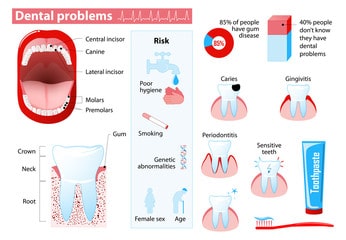Share this post
It is essential for you to avoid dental problems at all cost. Individuals who wait long spans between dental examinations, pay little touch for their oral hygiene and have a diet high in sugar and acidity will detect increased dental problems consequently.
There's an age-old expression that prevention is far better than treatment, which rings true in dentistry.
The Nigerian Dental Association reports that cavities and tooth decay are the nation's most common health issue; it is also one of Nigerian's priciest diet-related ailments. Following dental decay, the following most frequent dental problems, according to the University College Hospital, Ibadan and others, are:
- Gum disease (periodontal disease); and
- tooth reduction.
Tooth decay is the destruction of tooth coating brought on by a mix of plaque and inadequate diet. Routine and copious use of food or beverages high in sugar and acidity may erode the protective enamel coating of the teeth, which makes mineralized and much more vulnerable root cover expose. An alteration to your diet consisting of foods and beverages low in acid and sugar can help avoid dental problems
It's likely to possess disease, harm, and malformation from the teeth, mouth, and jaw although not experience pain or distress. Additionally, there are connections between systemic and oral health, including the following conditions: human papillomavirus (HPV), HIV/AIDS, obesity, coronary heart disease, cardiovascular disease, diabetes, stroke and autoimmune disorders like rheumatoid arthritis.
Thus, a vital step to avoid dental problems and prevent general health issues would be to regularly visit your dentist and dental hygienist for evaluation. Your dentist will examine the soft and hard tissues in your mouth, amass a health history and choose X-rays to help diagnose and identify any dental issues.
The dental hygienist will analyze the soft tissues for almost any sign of gum disorder, supply treatment to restore your mouth to a wholesome condition and promote perfect oral hygiene to decrease the risk of chronic gum disease.
Research indicates that major countries are becoming too self-satisfied about oral hygiene, in spite of the fact that the World Health
Organization has identified that oral hygiene is an"essential element to general wellbeing and significant to our health". The foundation for good oral hygiene will be to efficiently eliminate sticky, colorless bacteria called plaque. Plaque adheres to the soft and hard tissues in the mouth area and leads to tooth decay and gum disease.
Oral hygiene demands will vary among people, according to risk and need. At healthsoothe, we enlighten dentists and dental hygienists and every other individual about the very best products for use in their own dental health like toothbrushes, kinds of toothpaste, mouthwash, and some other specialty dental goods. We work closely with you to supply a tailored preventative strategy.
A simple regimen to avoid dental problems will be as follows:
- Brush twice daily with fluoride toothpaste to decrease the danger of corrosion.
- Adopt inter-dental cleaning to eliminate food trapped between teeth.
- Eat balanced foods low in acid and sugar.
- Limit snacking.
- Have dental sealants put where necessary to avoid dental problems
Our Advice
See your dentist and dental hygienist often for oral exams and professional cleanings. The fantastic thing is that nearly all dental diseases are preventable.
Occasionally preventative measures alone aren't sufficient, therefore it is very important to work closely with your dentist and dental hygienist to set up danger along with a tailored dental plan.

Isreal olabanji a dental assistant and public health professionals and has years of experience in assisting the dentist with all sorts of dental issues.
We regularly post timely and trustworthy medical information and news on Fitness, Dental care, Recipes, Child health, obstetrics, and more.

